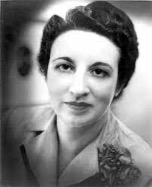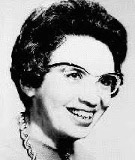Husband and wife psychologists—he wrote 70 books, she won the National Medal of Science. Their funds at The Trust support a wide range of issues.
Anne Anastasi (1908-2001)
John Porter Foley Jr. (1910-1994)

Professor and psychologist Anne Anastasi’s influence is felt by every student who takes a psychology course or anyone who fills in the answers on a standardized test intended to measure achievement, intelligence, aptitude, personality, or creativity.
Her book “Psychological Testing,” a classic first published in 1954, introduced students to the fundamentals of test design, selection, and interpretation and drew attention to cultural fairness in testing. Her point was that psychological tests could be misused in ways that would make them worthless. The greater consequence of such misuse would be that the results, under the wrong circumstances, could harm an individual or group.
What made Anne unusual among psychologists was her keen interest in what was beyond test results: how they were affected by a person’s life history, intelligence, heredity, and other variables. As a result, Anne Anastasi became synonymous with “psychometrics”—the measurement of human characteristics.
In the 1970s, the notion of creating a culture-free test of intelligence, aptitude, or achievement was gaining popularity, but Anne argued that such measurements could not avoid gender and racial bias. She was renowned for her studies of individual and group differences and the interplay of biology and environment in shaping personalities and intellectual growth, commonly referred to as “nature versus nurture.”
Anne Anastasi was born on December 19, 1908, to Theresa Gaudiosi Anastasti and Anthony Anastasi, Sicilian immigrants. Her father worked for the New York City Board of Education, but he died when Anne was only a year old. Her mother supported the family by working as office manager for the Italian newspaper Il Progresso.
Anne’s education was unconventional. She was homeschooled by her grandmother until sixth grade, and after two years in public school, she graduated at the top of her class. High school, however, presented a number of obstacles. Evander Child High School in the Bronx was under renovation and parts were left open to the cold and rain, she said, and she was forced to study under the worst conditions. “The building should have been condemned,” she recalled. She also was extremely nearsighted, so she couldn’t see from a distance what the teachers were writing. After only two months, she dropped out.
A family friend suggested she try college instead, insisting there were “alternate routes.” At the time, certain schools would accept students without a high school diploma, provided they scored well on the entrance exam. Anne took concentrated courses at Rhodes Preparatory School in Manhattan for two years, then applied to Barnard College at age 15. She intended to major in math and minor in physics and chemistry, but her second-year course in psychology upended that plan.
Harry Hollingworth, chairman of the psychology department at the time, was “a scientist through and through,” she said. She also remembered reading a compelling article by the British psychologist Charles Edward Spearman that stressed the use of mathematics in studying psychological problems. She realized she could have the best of both worlds.
Anne graduated from Barnard in four years with a bachelor’s degree in psychology and the Duror Memorial Fellowship, presented to the student who showed the “greatest promise of distinction in her chosen line of work.”
While at Barnard, she often would sit in on graduate-level courses at Columbia University. By the time she enrolled in the Ivy League school, she took the test for a master’s degree, skipped ahead, and earned her PhD in psychology at age 21 in 1929. She also met her future husband, John Porte Foley, Jr., an industrial psychologist.
Right out of graduate school, she was offered a $2,400-a-year teaching job at Barnard by her old mentor, Hollingworth. She remained there until 1930, when she became chairman of the psychology department at Queens College.
Anne and John were married in 1933 and moved into a six-story townhouse on East 38th Street in Manhattan. For professional reasons, Anne Anastasi never changed her last name, an unusual move in the 1930s. Only a year into their marriage, Anne was diagnosed with cervical cancer. Although radium treatments successfully treated the cancer, she was unable to have children.
“In teaching or mentoring, Anne had few peers,” a former student, Oliva Hooker, said in a tribute. “Every student was made to feel as if his/her career was of primary concern. Whenever a candidate needed an emergency meeting, she made time.”
In 1937, Anne published the first edition of “Differential Psychology,” a 900-page work on what she called “the scientific study of differences between groups,” reflecting age, experience, education, family, gender, religion, culture, and social class. This was followed by “Psychological Testing,” her most well-known text, translated into nine languages and used throughout the world.

In 1947, Anne joined the Fordham University faculty as an associate professor in the Graduate School of Arts and Science and became a full professor in 1951. She was promoted to chairman of the psychology department in 1968 and retired in 1979, when she was named professor emerita.
In her daily life, Anne was noted for her absent-mindedness as well as her brilliance. One of her Fordham colleagues recalled hearing a shriek coming from her office. Running to see what was wrong, she found Anne using a metal letter opener to pry a plug out of an electrical outlet. When asked if she got a shock, Anne replied, “How fascinating. How did you know it was a shock?”
In 1972, she was elected president of the American Psychological Association. Among numerous other awards, she received the association’s Distinguished Scientific Award for Applications of Psychology and the American Psychological Foundation’s Gold Medal for Lifetime Achievement. In 1987, President Ronald Reagan awarded her the National Medal of Science, the nation’s highest award for scientific achievement.
A self-proclaimed “workaholic,” Anne continued to travel, write, lecture, and consult well into her 80s. In all, she published more than 150 scholarly books and articles, balancing a deeply rational perspective with an insistence on solid science. “Every psychologist has heard of Anastasi,” said Mary Procidano, a former Fordham psychology professor. “She really defined the field.”
Anne died on May 4, 2001 at her home in Manhattan. She was 92.
John Porter Foley, Jr. was born on May 16, 1910, in Bloomington, Ind. He earned his bachelor’s degree from Indiana University in 1930, graduating Phi Beta Kappa, and his PhD in psychology in 1933 from Columbia, where he met Anne. John’s interest was directed more toward behavioral psychology, both in humans and animals. After he graduated, he and Anne lived apart for several years, pursuing their careers. He took a job as an associate professor at George Washington University in Washington, D.C., studying conditioned responses in rhesus monkeys, chimpanzees, and other primates.
Later, he branched out into evaluation and selection in the industrial world. In 1944, he joined the Psychological Corporation as director of its industrial division in New York, working with companies to evaluate individuals’ talents as well as their relation to the organization and the workplace. Twelve years later, he set up his own industrial consulting business, J. P. Foley and Associates. John closed his office in 1986 but continued to practice on a limited basis.
During his lifetime, John Porter Foley Jr. published more than 70 books and articles on topics ranging from conditioned responses in primates to human behavior in the workplace, including “Human Relations and the Foreman” (1965), co-written with Anne. He died July 17, 1994, at age 74.
In her will, Anne Anastasi established two funds in The New York Community Trust: One is unrestricted, and the other is for the care of animals, with emphasis on medical care.
Photo Credits:
http://psychologistoftheweek.blogspot.com/2012/10/anne-anastasi.html
https://feministvoices.com/profiles/anne-anastasi